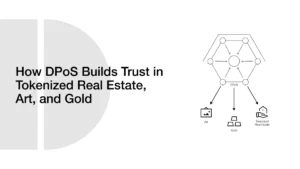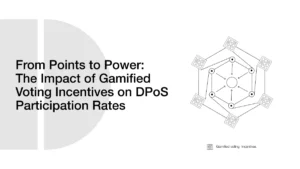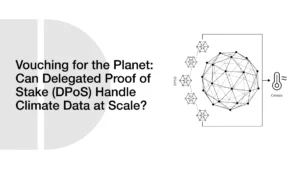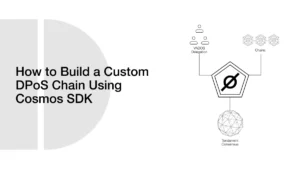Is Delegated Proof of Stake (DPoS) the Most Scalable Consensus Mechanism Ever?
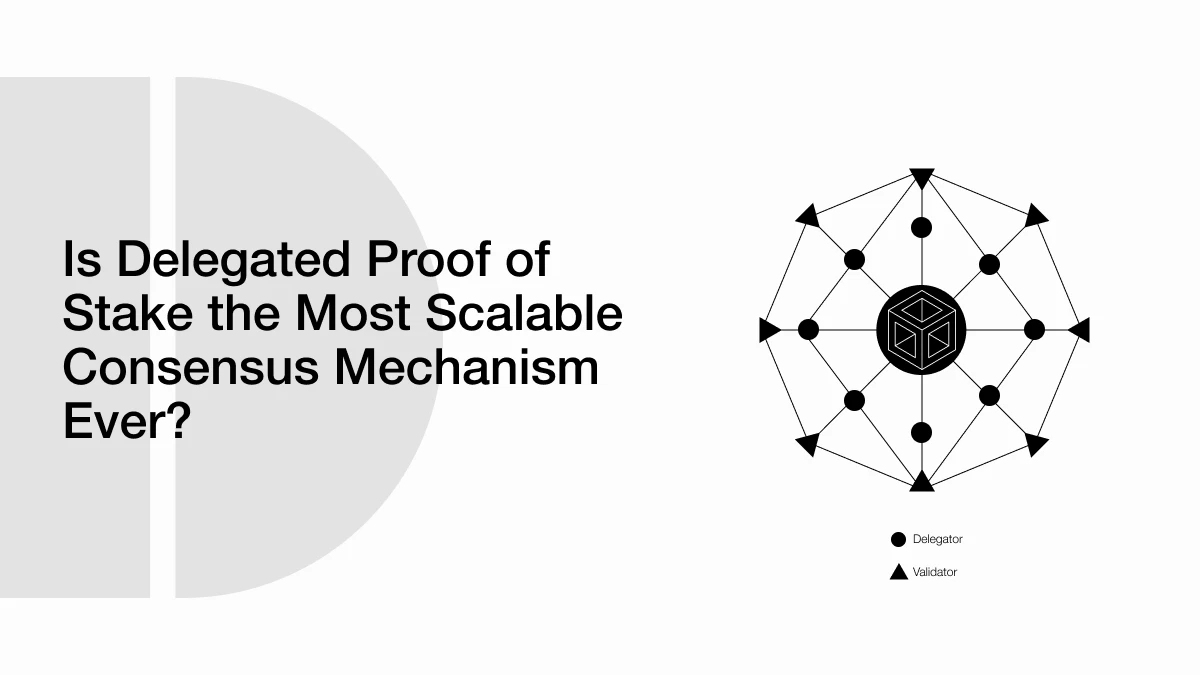
In the early days of blockchain, securing a decentralized network required either raw computing power or large capital reserves. Proof of Work rewarded those who could afford advanced hardware. Similarly, Proof of Stake gave more control to those with more tokens. Both systems functioned effectively, but left limited space for broader and more equitable participation.
- How DPoS and Democracy Work Together in Blockchain
- Is DPoS the Most Fair and Scalable Consensus Model?
- Why Blockchain Consensus Matters
- The History of DPoS
- Voting in Chains: Where Liquid Democracy Takes Shape
- Real-World Analogies That Make DPoS Easy to Understand
- Voting for Delegates = Electing a City Council
- Delegate Rotation = Political Term Limits
- Speed at a Cost: Efficiency Over Representation
- Fixing the Flaws: Where Algorithms Meet Governance
- Accountability Through Incentives
- Centralization Risks Beneath the Surface
- What Keeps It Democratic?
- DPoS Risks & Safeguards
- Conclusion
- FAQs
- Glossary of Terms
Delegated Proof of Stake, or DPoS, was introduced as a solution to address these limitations. It offered a model where decision-making power could be distributed more fairly. Instead of validating blocks directly, users could vote for a limited group of trusted delegates. These delegates were responsible for maintaining the network.
This model aimed to strike a balance between decentralization and efficiency, promising faster transactions, lower energy use, and a system where small token holders could have real influence. However, as with any ideal, putting it into practice revealed both its strengths and vulnerabilities.
How DPoS and Democracy Work Together in Blockchain
Delegated Proof of Stake (DPoS) works much like a democracy. In DPoS, people who hold tokens don’t need to run computers or technical systems. Instead, they vote for someone else, called a delegate, to do the job. This process is just like how people vote for leaders in elections. The delegates are responsible for maintaining the network’s security and ensuring it runs smoothly.
If a delegate doesn’t do a good job, voters can choose someone else. This keeps the system fair. It provides everyone a chance to be part of the process, even if they don’t have a lot of money or technical skills. Just like in a good democracy, everyone’s voice matters in DPoS.
Is DPoS the Most Fair and Scalable Consensus Model?
Blockchain has long been touted as decentralized, but in reality, governance is often lacking. Delegated Proof of Stake (DPoS) acts as a counterweight to this tendency, enabling every holder of tokens, regardless of wealth or technical expertise, to exercise power. This idea implies that voters elect individuals whom they can trust to achieve transparency, accountability, and efficiency. However, does it promote inclusive governance?
The need to reconcile speed, justice, and participation will increase as the number of blockchain applications increases. Delegated Proof of Stake (DPoS) is a scalable variation of PoW and PoS, yet is it fair? This paper examines the democratic advantages of DPoS, the tradeoff, and how new protection mechanisms have made it more viable than ever.
Why Blockchain Consensus Matters
There are many kinds of blockchains today. Some are more open and fair, while others are more controlled. Each one uses a different way to agree on transactions. This technique is called a “consensus mechanism.” One popular type is called Delegated Proof of Stake (DPoS). It has some beneficial features, but it also has a few drawbacks, particularly in terms of decentralization.
Decentralization means no one person or company is in charge. It’s a key idea in the world of crypto. That’s why it’s important to use tools that let you stay in control of your money. A non-custodial wallet is one such tool. It allows you to hold your crypto directly, not through a third party.
The History of DPoS
This timeline highlights major blockchain projects that implemented or evolved the DPoS consensus mechanism.
- 2014 – BitShares: First implementation of DPoS by Daniel Larimer.
- 2017 – EOS: Popularized DPoS with 21 block producers.
- 2018 – TRON: Adopted DPoS with 27 Super Representatives.
- 2021+ – CD-DPoS: Introduced community detection and reputation scoring in voting logic.
Voting in Chains: Where Liquid Democracy Takes Shape
To understand how DPoS works beyond the whitepaper, a 2023 study examined governance behavior in EOS and Steem. What emerged was not just voting, but a layered process that closely resembled liquid democracy.
In these networks, users often passed their voting power to others they trusted. Those intermediaries might then delegate again, creating a web of trust-based decision-making. Power did not just follow tokens. It followed relationships, reputation, and perceived integrity.
This flexibility allowed participants to stay engaged even if they could not vote directly. But the study also revealed an imbalance. A small number of highly active delegates tended to garner the majority of the votes. While the structure supported dynamic participation, it did not automatically ensure broad representation.
Real-World Analogies That Make DPoS Easy to Understand
To understand Delegated Proof of Stake (DPoS), it is helpful to consider examples of systems used in daily lives. Although the idea of blockchains and consensus models might seem complicated, DPoS is, in fact, similar to numerous analogues of a democratic world, only in the digital sphere.
Voting for Delegates = Electing a City Council
In DPoS, token holders don’t need to manage the blockchain themselves. Instead, they vote for delegates, just like citizens vote for city council members. You’re not the one running city utilities or managing roads, but you choose the people who do. If they don’t perform well, you vote for someone else. This makes DPoS accessible: everyone gets a say without needing technical expertise.
Delegate Rotation = Political Term Limits
In healthy democracies, leaders are rotated to prevent long-term power hoarding. DPoS mimics this with rotating delegates. If a delegate performs poorly or loses trust, voters can replace them, just as they would when electing new officials at the end of a term. This keeps governance fresh, fair, and responsive.
Speed at a Cost: Efficiency Over Representation
One of the most frequently mentioned advantages of DPoS is its speed. Transaction confirmations can occur in seconds, making them ideal for applications that require rapid throughput. EOS, for example, uses this structure to enable quick consensus and scalability.
ALSO READ: How DPoS Turns Token Holders Into Decision Makers | Crypto Democracy in Action
However, this efficiency comes with a cost. Due to the small number of delegates, fewer people are responsible for making choices on behalf of the network. This can ultimately lead to a governance arrangement in which the same delegates are consistently re-elected. When that happens, power begins to concentrate, albeit accidentally.
The same design that allows DPoS to move swiftly can also limit the variety of voices influencing its direction.
Fixing the Flaws: Where Algorithms Meet Governance
Recognizing these risks, researchers and developers have introduced new models to strengthen fairness within DPoS systems. One solution involves integrating reputation systems. These models assess voting history, performance, and behavior to identify the most trustworthy delegates.
For example, CD-DPoS uses a modified version of PageRank along with community detection algorithms. This allows voters to cast multiple votes, each weighted by factors beyond token ownership. Another variation, known as PDPoS, adds a second layer of delegation. This distributes responsibility and enhances scalability while reducing the potential for power concentration.
These approaches show that DPoS is not static. It can evolve through thoughtful engineering and continuous feedback.
Accountability Through Incentives
DPoS systems align incentives in a way that encourages both performance and participation. Delegates earn rewards for producing blocks. In many cases, a portion of those rewards is shared with the voters who elected them. This creates a direct connection between governance and economic value.
The networks, such as EOS and Tron, have introduced rotation schedules, inactivity penalties, and reward-sharing functions. These attributes are meant to make delegates answerable to the community. Voters, on their part, will have a reason to remain active and well-informed.
Instead of basing everything on idealism, DPoS promotes accountability by using verifiable results and objective rewards.
Centralization Risks Beneath the Surface
Although DPoS is democratic, it remains susceptible to centralization. The amount of voting power tends to be proportional to the amount of tokens held. This implies that large holders can have a significant influence on the selection of delegates and the formulation of policies.
In some cases, coalitions or alliances are formed behind the scenes. A bloc of financially empowered actors may take over voting rounds, which is against the principle of equal representation. Critics say that this starts to resemble corporate governance rather than decentralized democracy.
Even with tools like reputation scoring and algorithmic fairness, DPoS depends on engaged participants and well-designed rules. Without those, it risks appearing democratic but not being so in substance.
What Keeps It Democratic?
For DPoS to succeed as a democratic model, certain conditions must be maintained. Participation needs to be consistent and informed. Token holders should vote regularly and assess delegate performance rather than relying on passive delegation.
Rotation of delegates is another key factor. Term limits and performance thresholds can prevent the consolidation of authority. Transparent governance frameworks also play a vital role. When rules for elections, rewards, and penalties are clearly defined, trust increases.
Systems like CD-DPoS and fuzzy-set voting have demonstrated that these principles can be applied successfully. The result is a system that not only performs well but also remains responsive to the community it serves.
DPoS Risks & Safeguards
| Risk | Why It Happens | How It Can Be Mitigated |
| Power Centralization | Large token holders dominate voting | Vote caps, quadratic voting, and reputation scoring |
| Voter Apathy | Users delegate once and forget | Vote decay, rotating elections, reward penalties |
| Delegate Collusion | Behind-the-scenes alliances | Transparency rules, slashing, and community audits |
| Sybil Attacks via Vote Buying | Bad actors buy multiple identities | Identity verification or stake-based penalties |
Conclusion
Delegated Proof of Stake offers a unique approach to blockchain governance. By allowing users to elect delegates and indirectly influence protocol decisions, it opens up space for broader participation without sacrificing efficiency.
Nevertheless, its democracy is not a given design. Power must be avoided to be concentrated or unaccountable, and it needs active participation, considered engineering, and ongoing assessment. Positively, experiments with voting mechanics, reputational systems, and system design are being done, indicating that the model is evolving towards a better future.
Decentralized Proof of Stake can be characterized as a moving democratic ideal. Striking a balance between performance and fairness, speed and inclusion, is a significant challenge. Whether it fully succeeds depends on the communities that use it, the mechanisms that guide it, and the willingness to keep asking the right questions.
FAQs
- What is Delegated Proof of Stake (DPoS)?
DPoS is a blockchain system where token holders vote for delegates. These delegates run the network by validating transactions and creating new blocks. It’s faster and more energy-efficient than Proof of Work.
- Can small token holders participate in DPoS?
Yes. Even if you have a small number of tokens, you can still vote for delegates. You don’t need expensive machines or to run a validator. Your vote still counts.
- Do I earn rewards by voting in DPoS?
Often, yes. Many delegates share their rewards with voters. This means small token holders can earn passive income by choosing good delegates.
Glossary of Terms
DPoS (Delegated Proof of Stake)
A consensus model where token holders vote for delegates to validate blocks.
Delegate
A person or group elected by token holders to manage the blockchain and earn rewards.
Validator
A node responsible for checking transactions and adding new blocks to the blockchain.
Voting Power
The influence a token holder has in choosing a delegate.
Vote Decay
A rule where votes lose strength over time unless refreshed, to encourage active voting.
Reward Sharing
When delegates share part of their earned rewards with the voters who chose them.
Slashing
A penalty for validators who break the rules or harm the network.
Reputation System
A scoring method is used to track and reward reliable delegate behavior.
Quadratic Voting
A voting system that reduces the power of large token holders by using weighted votes.
Token Holder
Someone who owns tokens in a blockchain and can vote or delegate their rights.
Sybil Attack
A type of fraud where one person creates many fake identities to manipulate voting.

